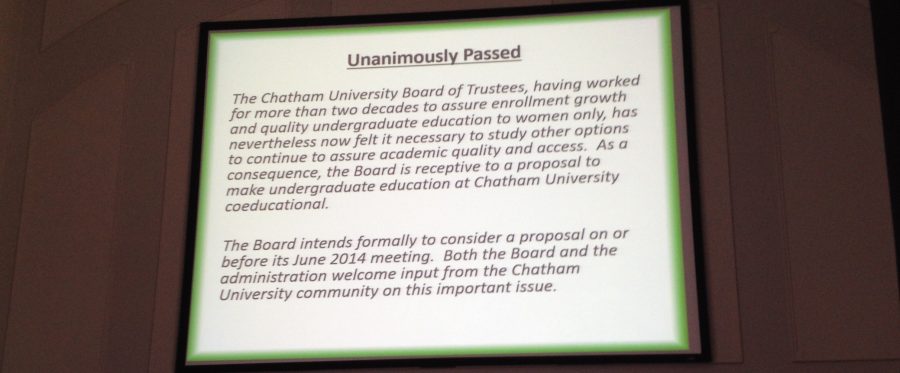On Tuesday, February 18, students, faculty, and staff met in the Campbell Memorial Chapel for a Campus Community Update led by President Esther Barazzone with regard to decisions made by the Board of Trustees during their February 12 to 14 meeting.
The Board made three major decisions during their most recent meeting.
First, they unanimously passed the beginning of phase 1B of the construction of the Eden Hall Campus for the Falk School of Sustainability.
Phase 1A of Eden Hall construction, which allowed for the construction of a public venue, field labs with research facilities, a café, and below ground infrastructure, cost $17.7 million.
Phase 1B, which will encompass the construction of a common area and a residence hall, will cost $27.7 million. Construction will begin in April.
Second, the Board passed a 3 percent increase in tuition, board, and fees.
President Barazzone acknowledged the student petition against tuition increase. In reference to the Board, “They are hearing you, but they simply could not honor that request, with great regret,” Barazzone said.
The final decision was to reevaluate Chatham College for Women’s feasibility as a single-sex institution and to vote in June about the college becoming coeducational.
Although the university’s enrollment, endowment, and assets have significantly increased since Barazzone’s arrival in 1992, undergraduate enrollment has not.
Despite a spike in 2008 when 729 students were enrolled, current enrollment is 543, just 25 students higher than it was in 1992. Chatham has experienced an average decline of 9 percent each year since 2008 “not for want of trying.”
Barazzone said a “critical mass” of 800 to 1000 students is “necessary to create a vibrant campus community and provide appropriate numbers of faculty and classes.”
According to current survey records, only 2 percent of high school girls would consider attending a women’s college. Three of every four women’s colleges experienced declining enrollment from 2010 and 2012.
In response to first-year student Margaret McGovney’s question concerning the better performance of women students at single-sex institutions, which gained applause and cheers from students and staff in the audience, Barazzone said, “No matter how perfect a product you have, if only two percent of prospective college students want to come, you need to think about how to solve that issue.”
The Board of Trustees has considered other options, including marketing Chatham as a “transfer school” to which students transfer after community college or doing away with undergraduate programming entirely; however, they saw no options other than going coed as desirable.
Board Chair S. Murray Rust III said, “We’re looking for ways to move forward that best preserve what we have while appealing to a broader group of students.”
Vice Chair Sigo Falk added, “We really can’t think of anything but a major reorganization now.”
“This is not a way of bringing men to Chatham,” Barazzone said. “It’s a way of bringing more women to Chatham.” This statement was followed by a burst of laughter from the audience.
This was not the only scorn about the possible switch to coeducation expressed at the meeting. As the sun set and the chapel dimmed, Barazzone answered many questions from concerned students.
Students brought up issues ranging from housing to sexual assault.
Students including first-year Meg Scanlon and junior Karen Salaverria expressed concerns about possible loss of single-professor departments and dual-enrollment programs.
Others, like first-year Maryann Fix, expressed frustration at the possibility of Chatham going coed because of the “promise” that had been made for four years of single-sex education.
President Barazzone addressed questions and concerns until she had to leave to address alumnae.
Students continued to discuss matters after the meeting concluded, and many took to social media sites, like Facebook and Twitter, to express their reactions.
Sophomore Melissa Garret believes a move away from single-sex education would be a mistake. “This just isn’t what Chatham is about. Women need to know just how successful and empowering they can be.”
A self-proclaimed feminist, Barazzone seems to agree about the importance of women’s education, but she is concerned about Chatham’s ability to survive as a single-sex institution.
“This is an interesting place, and the problem is not enough people have access to it,” Barazzone said. “We have a vibrant university, and we are committed to keeping it vibrant.”



Alexandre Ber • Dec 7, 2014 at 10:50 pm
It’s really a nice and helpful piece of info. I am glad that you shared this helpful info with us. Please keep us informed like this. Thanks for sharing.